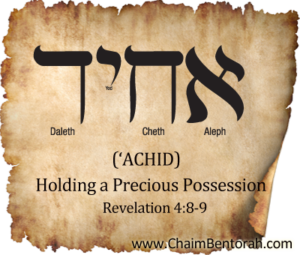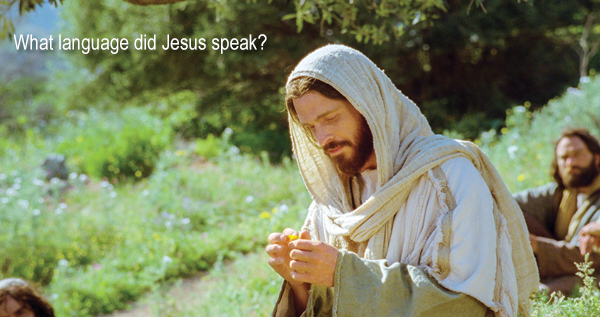Revelation 4:8-9 “And the four beasts had each of them six wings about him, and they were full of eyes within: and they rest not day and night, saying, Holy, holy, holy, Lord God Almighty, which was, and is, and is to come. (9) And when those beasts give glory and honor and thanks to him that sat on the throne, who liveth forever and ever,”
 For most Christians, the book of Revelation is a book of prophecy and nothing more. Yes, it is a book of a “blessed hope” where we get to see God give the wicked their just desserts with a seven-year tribulation period while the righteous Christians enjoy a feast at the marriage supper of the lamb.
For most Christians, the book of Revelation is a book of prophecy and nothing more. Yes, it is a book of a “blessed hope” where we get to see God give the wicked their just desserts with a seven-year tribulation period while the righteous Christians enjoy a feast at the marriage supper of the lamb.
Stop and consider for a moment. This book was given to the seven churches to be a source of comfort. What comfort is there is learning of an event that is over two thousand years in the future? I am sure reading about locusts coming out of the earth and stinging the bad people isn’t going to bring much comfort if you are sitting in the waiting room of an arena where you are about to feed to one of God’s more aggressive and hungry created beings. But to a first-century Jewish Christian he would read things in this book that we 21st Century Christians would not read unless we shift our focus off events that will have nothing to do with us if we are raptured out before those events occur+.
We are facing fearful times. The media and entertainment industry are mocking Christianity and even persecuting them. The government is considering laws that would invade our religious freedom and there is a woke culture that is out to destroy Christianity. We cry out to God to deliver us, send revival so our nation will be saved as well as bring us a few little goodies like healings and miracles that will make us prosperous and, yes, vindicate us from all the false accusations. Well, maybe you haven’t received an answer to those prayers yet, but in the Book of Revelation God gives us many things for the here and now and not for the future.
Let’s start with the one who sat on the throne. John was respecting the first-century Jewish abhorrence of speaking the name of God so he merely said the One who sits upon the throne. Most Bible Scholars agree this is God Himself. Now, why is God sitting? I guess if you were running the universe for thousands of years you would also need to sit and rest. I mean all this controlling of everything can wear poor God out.
Obviously, this is a metaphor. God does not need to sit and rest. Note Exodus 18:13: “And it came to pass on the morrow, that Moses sat to judge the people: and the people stood by Moses from the morning unto the evening.” Moses sat and the people stood. Jethro, his father-in-law, told him that was not a good thing to do. If God were really in charge, He should be the One sitting not Moses, and Moses should be standing with the people. Or else, if Moses was too tired to stand he should sit and advise the people who come to him for Godly advice to also sit. In Oriental culture, a king sat on a throne and anyone who appears before him are to stand. That shows superiority over his subjects. It would be an insult if one sat before a king while the king was sitting on his throne. Yet, in this heavenly scene in heaven, not only is God sitting on his throne but look back to verse 4 in Revelation 4: “Around the throne were twenty-four thrones; and upon the thrones, I saw twenty-four elders sitting, clothed in white garments, and golden crowns on their heads.” The twenty-four elders are also sitting on thrones and they are also wearing crowns. This is not a picture of a king and His subjects, it is something else. The word in Aramaic for throne as in the Greek is the same for the seat of both God and the twenty-four elders. In Aramaic, it is the word karas which is not a word for a throne or even a seat. It is a word for the stomach, belly, or womb. This is not a picture of twenty-four elders who are ruling with God but are born of God, born again, a rebirth where one is born in the spirit and born sinless through the blood of the lamb. To first-century Jewish Christians and to us today it is the comforting note that we are born into God’s family, we are His children and no matter what happens to us, like a loving parent God is watching out for us, He has our backs.
But there is another picture here. Note verse 8 tells us that the living creatures cry; “Holy, Holy, Holy Lord God Almighty. So, what is so special about that? Just this, the word Almighty in Aramaic is not your word for Almighty. It is the word ‘achid which means holding. But when used in a marriage arrangement, it has the idea of holding a precious possession. It is also a word for betrothal or as we would say in modern language an engagement to be married. In other words, even though in the betrothal the couple is legally married, they do not live together nor do they consummate the marriage until the betrothal period of one year ends. That may explain why the twenty-four elders wear crowns. Both bride and groom in a Jewish wedding each wear a crown. Here is the greatest comfort I find in the Book of Revelations. Most Bible scholars believe, and I agree, that the twenty-four elders are the twelve tribes of Israel and the other twelve represent the gentile nations.
By using the Aramaic word ‘achid God is telling us that He is the “Lord God our betrothed.” We are his fiancée, his beloved whom we are married to and once in heaven our marriage will be consummated. But while on earth, like a protective, loving Bridegroom, God is watching over us very closely to protect us and do whatever it takes to bring us joy and happiness.
To the first-century Christians and to the 21st-century Christians who are facing hard times and persecution, we are being assured that we have a Divine Fiancee who is watching closely over us.
Hi there! Thank you for reading this Daily Word Study. Can I ask a favor? Share this Daily Word Study with your friends on Facebook and Twitter by clicking one of the icons below.
Thanks & Blessings, it means a lot to me!








Very encouraging and enlightening! Especially after reading someone dissect ‘the beasts’ of the anti-Christ system.
Some years back, I was afraid of God’s Judgement Day (who wouldn’t be) concerned that I wouldn’t be accepted. Last Sunday, I saw a vision of standing next to Him. Like Peter in his nativity, I said, ‘not so Lord, forgive my thought’ and I sensed Him replying, ‘you’re my bride, why wouldn’t we stand together’.
I appreciate so much your profound insight into the Word of God. It is really like unto being drenched in the purifying presence of Holy Spirit. I would like your help on Ps 68:6. What does the word solitary mean as it relates to this verse? Once again, thank you.
This is absolutely a beautiful teaching to me. I love the Book of Revelation and have for many years… but of course… I had no idea about this!!! Thank you for all your teachings!!!
What picture of marriage!
Is not the year of betrothal a time of getting to know your wife or husband with your heart first.
As we give our heart to God we begin our time of betrothal here on earth first, so that we get to know Him first before the consummation.
Wonderful insights into reading Revelation 4:8-9. Indeed Revelation was meant to comfort the Seven churches under persecution. I have learned the meaning of the metaphor “the One sitting on the throne” and also Aramaic word “achid” for “Almighty” meaning “holding” a precocious possession. Or when used in a marriage context means betrothal, engaged.
My question is this, Revelation was written in Greek. why use Aramaic meaning which may have not been the mother tongue of the Revelation audience?
Can you explain where you find the word karas? All I can find is the word thronos. I would like to learn more!